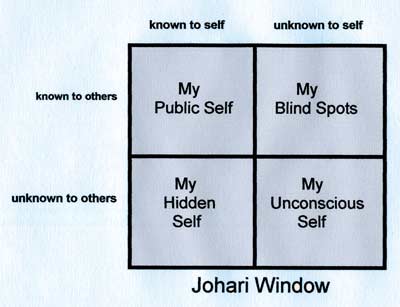

THERAPY
begin therapy
contact me
TOPICS
depression
anxiety/panic attacks
cope with flashbacks
anxiety & depression
anger management
blame-o-holics
addiction
dual diagnosis
grief & loss
grief suggestions
codependency 1
codependency 2
coda recovery
childhood trauma
on being a therapist
RESOURCES
Carl's Videos
Johari window
my child within
shame & guilt
fear of intimacy
reparent WC
shattered
serenity prayer
control/responsibility
empathy
taming the mind
mindfulness
stress management
spam of the mind
self-care
healthy conflict
assertiveness
healthy boundaries
meditation
mistaken beliefs
IQ vs. EQ
maturity/immaturity
happiness habits
Pollyanna thinking
basic human rights
helpful quotations
helpful books
helpful movies

Johari Window: A Useful Tool for Understanding Self
Johari
Window - named for its creators,
Joseph Luft and Harry
Ingham - is a useful tool for
 understanding
how therapy can help us live more effective lives. The four "panes" of
the Johari Window represent four parts of our Self.
understanding
how therapy can help us live more effective lives. The four "panes" of
the Johari Window represent four parts of our Self.
My Public Self is what I show others about me. My Hidden Self is what I choose to hide from others. My Blind Spots are parts of me that others see but I do not. My Unconscious Self are parts of me I do not see nor do others. We all have these four parts of Self, as shown in the Johari Window diagram, but their respective sizes vary in each of us.
A more fully aware person has a large Public Self with the other three areas small in comparison. This person understands why she acts the way she does and is genuine and open with others because she has minimized her Hidden Self and Blind Spots while working to bring the Unconscious Self to greater awareness. She is in touch with her needs, feelings, and values - her True Self - the source of her wisdom and identity.
A generally unaware person has a small Public Self with the other three areas large in comparison. This person acts in ways he doesn't understand because outdated decisions and defense mechanisms have caused him to develop substantial Blind Spots. In addition, he is guarded and less genuine with others because he has developed a significant Hidden Self as a defense against his own deep-seated shame. In short, he has disconnected from his True Self, becoming more defended than genuine.
Let's review: Overwhelming emotional pain, particularly early in life, causes us to utilize whatever methods and defenses are necessary to survive. These methods offer short-term relief but can create long-term problems because they often require us to repress or disconnect from our painful emotions. Thus, our Blind Spots, Hidden Self, and Unconscious Self expand, and our Public Self shrinks as we distance ourselves from our feelings and needs. In essence, we lose touch with our True Self, which is our real compass and the source of our wisdom and identity.
A solution: Therapy can assist you in expanding your Public Self while shrinking your Blind Spots, Hidden Self, and Unconscious Self. As your Public Self expands, you will reclaim disowned parts of yourself - the parts you had to abandon to survive. In essence, you will reclaim your True Self - the source of your wisdom and identity. Are you ready for the journey? If so, then click on the photo below to request online therapy.
Click below to view Carl's 4-minute video of this article:
To follow my posts on Facebook, please click the Like and/or Share buttons below:
Click on the photo below to request online therapy..

for a new beginning...
Home / My Credentials / Counseling Philosophy / Online Therapy Risks & Benefits / Services & Fees / Confidentiality / Begin Therapy / In Crisis Now? / Contact Me / Carl's YouTube Videos / Sitemap
Copyright 2005-2022 Serenity Online Therapy
All Text and many photos by Carl Benedict